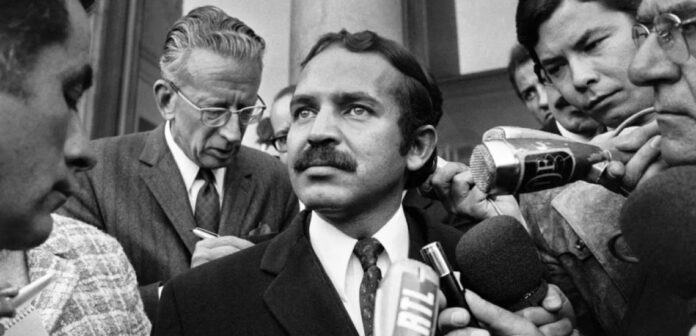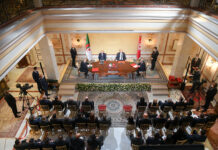This Friday, September 17, Abdelaziz Bouteflika died. The former Algerian president will have reigned for twenty years over the country.
On September 4, 1963, when Ahmed Ben Bella was the very first president of Algeria to become independent, a young man was appointed Minister of Foreign Affairs. He is only 26 years old and Abdelaziz Bouteflika has already taken care of the portfolio of Youth, Sports and Tourism. Just appointed a member of the Central Committee and the political bureau of the National Liberation Front (FLN), Bouteflika was simply to ensure the interim head of Algerian diplomacy. But he eventually became the holder of the position, which he held for more than fifteen years. While Houari Boumédiène became President of the Republic, the latter saw in Bouteflika a man of confidence. De facto, the Minister of Foreign Affairs becomes the number 2 of the regime in place. Already at the time, he dreamed of putting on the costume of president. He had to wait until April 1999 for him to be elected head of Algeria.
Meanwhile, Abdelaziz Bouteflika must take his pain in patience: Colonel Chadli Bendjedid was preferred by the army, and “Boutef” knows that his time has not yet come. Farid Alilat, Algeria specialist and author of “Bouteflika. The secret story”, tells TV5 Monde that “it is at this moment that he begins what he will call ‘the crossing of the desert’, which is not one, since it is moving between France, Switzerland, the Emirates or Syria. Even though he had no political activity, strictly speaking, he knew he would return to Algeria to take power. In 1994, the military offered him the head of the country, in the middle of the black decade. He initially refused. But in 1999, he finally decided to accept and satisfy his ambition.”
Mandates too many
It is, in April 1999, a long reign that begins. After two terms, Bouteflika had the Constitution amended to run for a third, then a fourth. But the health of the then president is fragile: operated for a hemorrhagic ulcer in the middle of the fourth term, Bouteflika makes his public appearances increasingly rare. In a wheelchair, man cannot hide his illness. Despite his condition and paralysis, Abdelaziz Bouteflika will try to run for a fifth term in 2019. “This time, it’s the last straw, because his age, his illness, his absence, have largely contributed to his discredit,” recalls Farid Alilat. At the time, the demonstrations multiplied, algerians demanded the resignation of Bouteflika but especially the end of the regime. It is all the power in place that is rejected in the streets of Algiers and the big cities.
In the aftermath of Abdelaziz Bouteflika’s death, what can we learn from his record? The former president will undoubtedly go down in history as one of the most talented foreign ministers, whether in Algeria or internationally. In 1973, it was he who had made his country, although economically behind, the leader of the Non-Aligned group. At the time, he was more than a symbol. “He was the one who installed Algiers as the Mecca of revolutionaries and he was the one who, in the eyes of Algerians, made it possible to get out of the terrible civil war that shook this country,” summarizes historian Benjamin Stora. Third World activist, Bouteflika makes Algiers “the obligatory passage of diplomats from all over the world and the essential relay between the West and the young independent nations supported by the Soviet Union,” writes the press referring to the former foreign minister.
With Boumediene as his model, Bouteflika does not hesitate to bang his fist on the table when necessary. In 1999, he was presented as the consensus candidate. Elected with nearly 74% of the vote, the vote was criticized, but he quickly imposed his style: “Whether here or elsewhere, in France or Sweden, 74% of the vote is still respectable. I don’t like the 99%,” he says. Not necessarily knowing that his next elections will often be contested by the Algerian people as well. However, Bouteflika tried, when he came to power, to “reduce the prerogatives of the army that has held power in Algeria for a very long time”, Stora lawsuit. Minister Abdelaziz Bouteflika has long kept this revolutionary spirit – he had joined the National Liberation Army (ALN) in 1956, he was barely 20 years old at the time. Before wearing out over the years.
“I didn’t come for an armchair, I came to fulfill a mission”
His arrival in power also leaves a certain optimism. The black decade in Algeria leaves traces and Bouteflika then wants to impose himself as a reconciler. “I came for peace. If the Algerian people support my approach to peace, it’s perfect,” he said. If, on the other hand, the Algerian people did not follow, I say it for the fifth time, I will go home, I did not come for a chair, I came to fulfill a mission.” A whole program. Which the population sometimes believes, especially when he organizes a referendum on the Civil Concord. But quickly, his style annoys: not deigning to answer journalists, whom he hates, Bouteflika prefers to put a veil on the management of the country. An opacity that will not pass. Because behind the scenes, no one really knows what’s going on, either politically or in terms of finances. “Boutef” refuses to communicate with the Algerian Court of Auditors.
A management that will have crumbled over the years. Because at the time of its forced departure, Algeria is on the edge of the precipice. “Algeria depends on oil, gas and its coffers are empty. All the money made was squandered. The businessmen who could start an economic boom are those who are languishing, today, in prison, for corruption. The feeling that emerges from his presidency can be summed up in three words: a huge waste,” summarizes the specialist Farid Alilat. His absence, for nearly six years from the political scene, was also fatal to him. Bouteflika ends up losing the support of the army, which loosens a little ballast to a people whose protest grows from week to week. Since his departure in April 2019, he has been announced dead several times. This week, Abdelaziz Bouteflika passed away. But the trial of his years in power will continue.
Translated by Rifi-JDD
Source: https://lejournaldelafrique.com/lafrique-dhier/abdelaziz-bouteflika-du-succes-a-la-decheance/?amp=1











